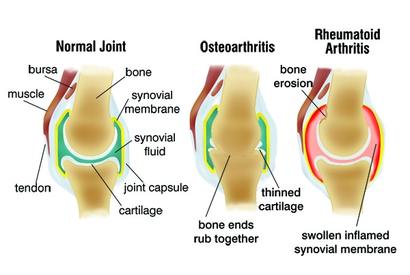Arthritis and Conservative Care
First, let me debunk the myth that cracking your knuckles will give your arthritis. No, this old wives tale is not true, what is true is that there are more than 100 different types of arthritis and arthritis is the leading cause of disability in the United States. Affecting 52.5 million US adults, people of all ages, sexes and races can and do have arthritis. It is most common among women and occurs more frequently as people get older. This blog will focus on two of the most common types of arthritis (Osteoarthritis and rheumatoid arthritis) and conservative options to manage the pain.

Arthritic joint changes
Osteoarthritis
Osteoarthritis or OA is the most common form of arthritis. Often referred to as overuse or “wear and tear”. OA occurs more commonly as people age however can come from obesity and the additional stress on the joints as well as injury to the joint. In the clinic we see OA more in the weight bearing joints (Knees, hips, feet and spine)
Symptoms of Osteoarthritis
You lose your body’s shock absorber, cartilage. Cartilage is the material material that covers the ends of bones. The damaged cartilage makes movement painful. Depending on which joint or joints are affected you may have:
- Deep, aching pain
- Morning stiffness
- Pain when walking
- Stiffness after resting
- Warm joint
- Swollen joint
- Restricted range of motion
Rheumatoid Arthritis
Rheumatoid Arthritis (RA) is an autoimmune disease. That means the immune system attacks parts of the body, especially the joints. That leads to inflammation, which can cause severe joint damage if not treated.
Rheumatoid Arthritis Symptoms
Symptoms can come on gradually or start suddenly. They’re often more severe than with osteoarthritis. In the early stages, people with RA may not initially see redness or swelling in the joints, but they may experience tenderness and pain.
These following joint symptoms are clues to RA:
- Joint pain, tenderness, swelling or stiffness for six weeks or longer
- Morning stiffness for 30 minutes or longer
- More than one joint is affected
- Small joints (wrists, certain joints of the hands and feet) are affected
You may also feel fatigued and notice that your appetite is down and you’ve lost weight.
Treatment for arthritis
Contrary to popular perception, diagnosis need not signal inevitable deterioration and disability. Instead, the aches, pains, and stiffness that characterize the condition can often be controlled. Early diagnosis is the key to conservative management. The sooner you recognize the presence of arthritis in any joint, the better the patient can understand what’s going on, what to expect, and how he or she can make things better. Several case reports describe the use of myofascial release techniques in a patient with a primary diagnosis of rheumatoid arthritis. The patient showed improvements in pain, fatigue, gastrointestinal tract function, cervical range of motion, and quality of life following the initial treatment series of six sessions. The patient maintained positive gains for 5 weeks following the final treatment.
The Behm Muscle & Joint Clinic approach to arthritis
Our Bellevue, NE Chiropractors are full body Active Release Technique certified, which is referred to as the gold standard in soft tissue. This myofascial release technique can be used in conjunction with joint mobilization (where appropriate) and rehabilitation exercises to maintain joint range of motion, decrease tension/adhesions in surrounding muscles, tendons and joint capsules. New patients are always welcome at Behm Muscle & Joint Clinic. To schedule a consultation for your arthritic pain you can give us a call at (402)292-1450 or schedule an appointment online.
About the author
Dr. Behm was born and raised in Papillion, NE. He received his Bachelor’s degree in Exercise Science from the University of Nebraska – Omaha and following his undergraduate studies was a certified personal trainer (NSCA-CPT – National Strength and Conditioning Association) in the Omaha area for years, helping clients achieve their health and fitness goals. He received his Doctorate in Chiropractic from Cleveland Chiropractic College – Kansas City. While in school, he received multiple certifications to increase his knowledge of the human body and how to properly assess and treat his patients. This translates into our integrative approach to Chiropractic care and our combination of therapies to better address your musculoskeletal complaints. Dr. Behm is excited to return to his hometown and serve the community around him.
